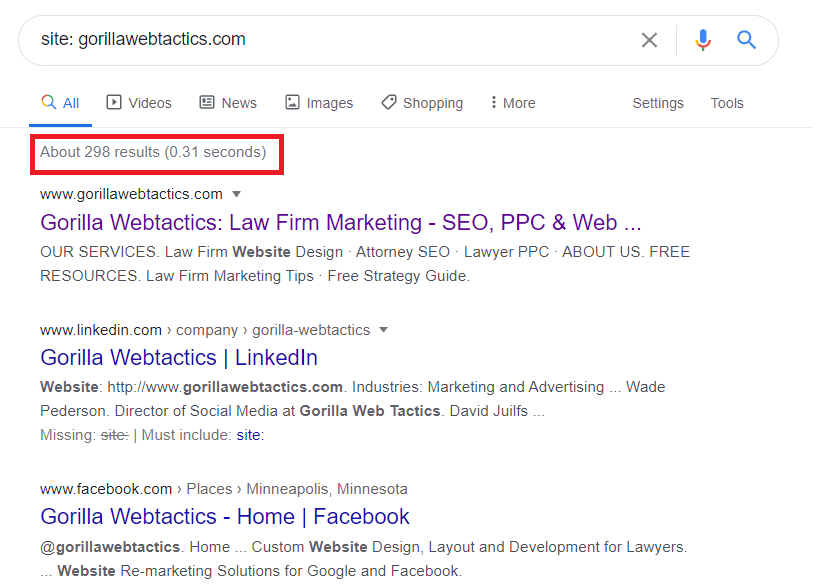
Every law firm dreams of getting ranked in the top ten organic search results. However, getting a high-rank search engine results is easier said than done. Creating and distributing high-quality content seems to be the primary SEO strategy most legal marketers rely on in the age of Google search algorithm updates like Panda and hummingbird.
While these strategies are essential, you also need to pay attention to technical SEO or on-page SEO. You won’t be able to rank high if your law firm’s website lacks structural and technical SEO elements.
Here are the four biggest technical lawyer SEO issues that you can’t ignore.
1. Lack of Internal Linking
One of the first things you need to take care of is the internal linking on your website. Internal links allow users to navigate your law firm website with ease to find what they want. So, if your internal links are broken or not carefully placed, it will affect the users’ browsing experience and negatively affect your site’s authority.
Furthermore, broken links can also waste your crawl budget as search bots often redirect users to other sites if they find too many broken links. That might leave most of your webpages un-crawled, keeping your crawl budget underutilized.
You can use any of the broken link checker tools such as Google Webmaster and Sitechecker. Once you have found all the broken links, make a list, and decide which pages you need to redirect. For example, broken links with multiple visits are often worth redirecting as they can still bring in substantial web traffic.
2. Utilizing Your Crawl Budget Efficiently
The next issue is not optimizing the crawl budget. Contrary to popular belief, you don’t have to accept the crawl budget as it is. You can optimize it for accurate indexing and higher ranking.
You can type “site: + your domain” in Google to find out pages indexed by the popular search engine. You can also find them using the Google Search Console. Check out these pages and make a list of the ones that you don’t want to be indexed.
It is usually better to restrict the webpages with little or no SEO value from getting indexed. Avoid using an unreasonable number of 301 and 302 redirects as the search bots will stop crawling them eventually, leaving the destination page un-crawled.
You need to find and fix HTTP errors and manage your URL parameters as well. Finally, you can also get rid of duplicate content to optimize your crawl budget, which brings us to the next point.
3. Eliminate Duplicate Content
Duplicate content will not only affect your search engine ranking but may also prompt Google to penalize you. You also need to optimize pages with little or no content or no call-to-action as they will probably prompt your website visitors to leave.
The issue of duplicate content may arise from auto-generated content, content copied from one of your webpages to another, and content sought from other resources. Sometimes, common Content Management System (CMS) functionalities like Sorting Parameters may also lead to duplicate content issues.
You can use tools such as Siteliner and Copyscape to find duplicate content on your website. If you find duplicate content on multiple URLs, use a canonical tag to guide the search bots to the actual resource or main URL.
Here’s what a canonical tag looks like –
“<link rel=”canonical”
href=“https://example.com/sample-page/”
You need to place it in the Meta description.
4. Keep It Mobile-Friendly
With almost half the web traffic (51.98%) coming from mobile phones in January 2020, one can’t stress the importance of having a mobile-friendly website enough.
If your website offers a substandard browsing experience on mobile, you are likely to lose almost half of your potential clientele. That, in turn, will increase your bounce rate, affecting your ranking, especially in local searches.
You can have different sites for mobile and desktop users. However, it may affect your lawyer SEO in the long run as it might split your link equity and also divert traffic from the original URL, leaving a room of suspicion at Google’s end.
Having a responsive website, however, is one of the best options you will have. It will not only provide better mobile user experience but also keep your SEO factors like webpage visits, time spent browsing a webpage, and bounce rates intact.
Parting Words
Technical SEO is crucial to ensure your law firm website ranks well in the search results. Hopefully, addressing these four technical lawyer SEO issues will help you set up your site for success. Of course, a trusted lawyer SEO marketing agency like Gorilla Web Tactics can take care of your technical SEO needs while you can focus on your practice. Contact us online or call us today at (612) 260-1506 to get a customized marketing plan for your law firm.



